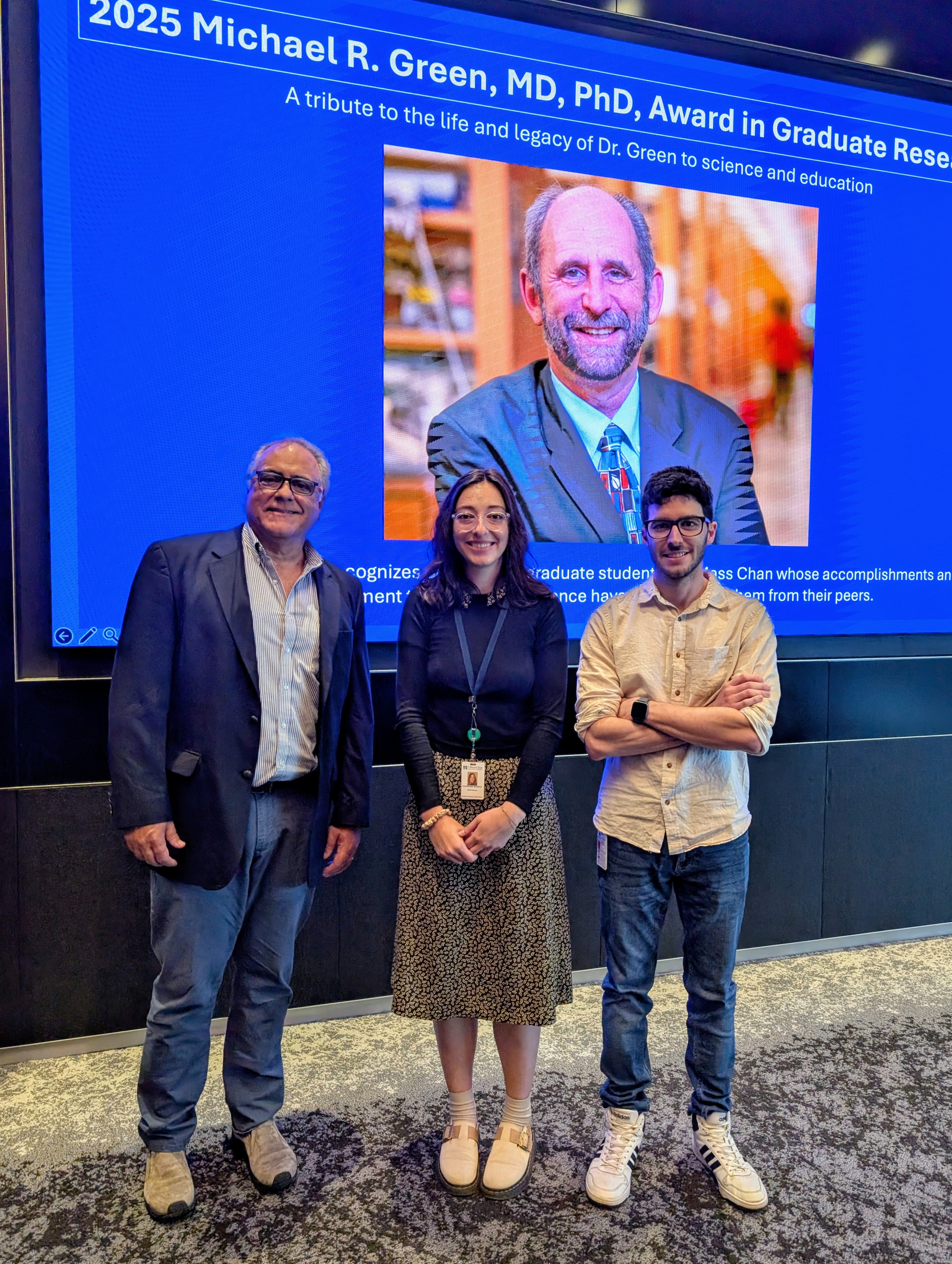Michael R. Green, MD, PhD, Award in Graduate Research
The Michael R. Green, MD, PhD, Award in Graduate Research was established in 2024 to celebrate Dr. Green's legacy as a scientific researcher in diverse fields—including gene regulation, epigenetics and cancer—and as a mentor to young scientists. This annual award recognizes outstanding graduate students at UMass Chan whose accomplishments, perseverance and commitment to research excellence have distinguished them from their peers.
Congratulations to the recipients of the 2025 Award!
Award in Cancer Biology: Katherine Murphy
Kat Murphy is a 3rd year graduate student in the Morningside School of Biomedical Sciences training in the Ruscetti laboratory.
 Kat is studying how genetic and genomic alterations in castration-resistant prostate cancer contribute to mechanisms of immunotherapy failure and ways to overcome resistance to provide effective therapeutic options for patients. Using novel, non-germline mouse models to produce distinct genetic subtypes, she has identified VEGF signaling in prostate tumors with MYC and p53 alterations as suppressive of T cell activity and shown therapeutic blockade of VEGF signaling can re-invigorate anti-tumor immunity and improve immunotherapy efficacy. Currently, she is investigating the role of IFN-gamma in driving the progression of a different subtype of prostate cancer, known as neuroendocrine prostate cancer, as well as its paradoxical impact on immunotherapy response. Kat hopes this research will lead to novel therapeutic strategies for prostate cancer patients with few effective treatment options.
Kat is studying how genetic and genomic alterations in castration-resistant prostate cancer contribute to mechanisms of immunotherapy failure and ways to overcome resistance to provide effective therapeutic options for patients. Using novel, non-germline mouse models to produce distinct genetic subtypes, she has identified VEGF signaling in prostate tumors with MYC and p53 alterations as suppressive of T cell activity and shown therapeutic blockade of VEGF signaling can re-invigorate anti-tumor immunity and improve immunotherapy efficacy. Currently, she is investigating the role of IFN-gamma in driving the progression of a different subtype of prostate cancer, known as neuroendocrine prostate cancer, as well as its paradoxical impact on immunotherapy response. Kat hopes this research will lead to novel therapeutic strategies for prostate cancer patients with few effective treatment options.
Award in Gene Regulation: Ezequiel Calvo-Roitberg
 Ezequiel is interested in understanding how mRNA biogenesis is regulated to produce alternative isoforms in mammalian cells. His focus has been on genomic characterizations of the sites where RNA transcription initiates and terminates, which determine the full sequence of mRNA molecules and the function of their encoded proteins. By analyzing short- and long-read RNA-seq data across human tissues and mammalian species, he revealed a coordinated relationship between where mRNA molecules begin and end that is based on the order in which alternative terminal sites appear in the genome. This positional coupling—termed Positional Initiation-Termination Axis—is most prominent in long genes and is governed by the rate at which RNA Polymerase II (RNAPII) progresses across these genes. These findings suggested variability in RNAPII trafficking across and within genes, leading Ezequiel to develop novel computational and experimental approaches to study RNAPII elongation rates using nascent RNA-seq data. Ezequiel’s thesis work uncovered novel layers of gene regulation that shape the spectrum of mRNA diversity across tissues.
Ezequiel is interested in understanding how mRNA biogenesis is regulated to produce alternative isoforms in mammalian cells. His focus has been on genomic characterizations of the sites where RNA transcription initiates and terminates, which determine the full sequence of mRNA molecules and the function of their encoded proteins. By analyzing short- and long-read RNA-seq data across human tissues and mammalian species, he revealed a coordinated relationship between where mRNA molecules begin and end that is based on the order in which alternative terminal sites appear in the genome. This positional coupling—termed Positional Initiation-Termination Axis—is most prominent in long genes and is governed by the rate at which RNA Polymerase II (RNAPII) progresses across these genes. These findings suggested variability in RNAPII trafficking across and within genes, leading Ezequiel to develop novel computational and experimental approaches to study RNAPII elongation rates using nascent RNA-seq data. Ezequiel’s thesis work uncovered novel layers of gene regulation that shape the spectrum of mRNA diversity across tissues.
Left to right: Award organizer Lucio Castilla, PhD; Award in Cancer Biology recipient Katherine Murphy; and Award in Gene Regulation recipient Ezequiel Calvo-Roitberg.
Past Recipients
2024
Award in Cancer Biology: Kensei Kishimoto
Kensei Kishimoto is a 4th year student in the MD/PhD Program / Medical Scientist Training Program, training in the Flavahan laboratory.

Kensei is testing the hypothesis that the histone acetylation reservoir provides acetyl-CoA to upregulate critical survival genes for glioblastoma cell survival. To this end, he has developed a novel CRISPR-Cas9-based sensor to determine the local concentrations of the metabolite acetyl-CoA in glioblastoma cells during energy stress conditions. These studies may define histone acetylation reservoir as a therapeutic vulnerability for glioblastoma multiforme, potentially stripping these tumors of their strategy for thriving in the harsh tumor microenvironments.
Award in Molecular Biology: Lucas Restrepo
Lucas Restrepo is a 5th year graduate student in the Morningside Graduate School of Biomedical Sciences, training in the Baehrecke laboratory.

Lucas is interested in elucidating the molecular mechanisms that regulate clearance of mitochondria, or mitophagy, using Drosophila as a model. Organelle-selective autophagy, the process of recycling parts of the cell, is essential for cell homeostasis, particularly for dynamic organelles like mitochondria. Defective mitophagy has a profound impact on neurodegenerative diseases, such as Parkinsons’ Disease. Lucas identified the mitochondrial gene Mtch as a critical regulator of mitophagy. He has used genetic, imaging and biochemical approaches to define its function during mitochondrial clearance and dissected its physical and genetic association with other regulators of mitophagy, such as PINK1 and Parkin. Lucas’ thesis research hopes to elucidate the mysteries and complexities of selective autophagy during development.
The recipients presented their research at the MCCB In-House Seminar Series on September 5, 2024.
The Michael R. Green, MD, PhD, Award in Graduate Research